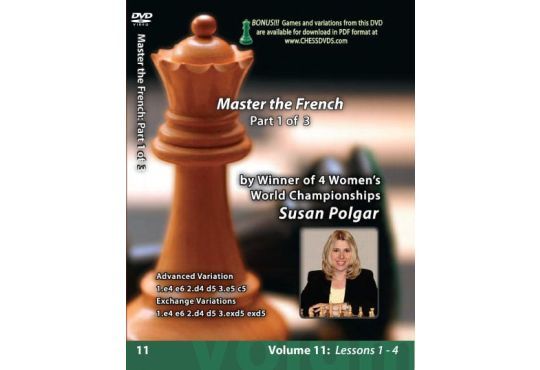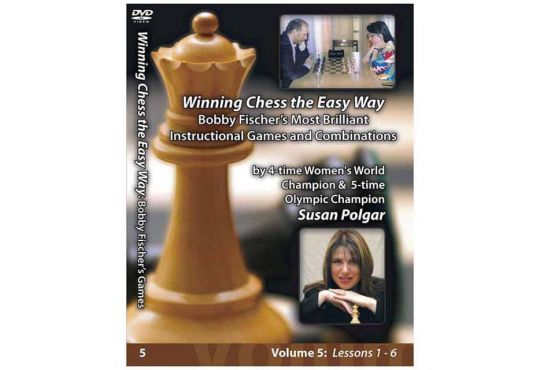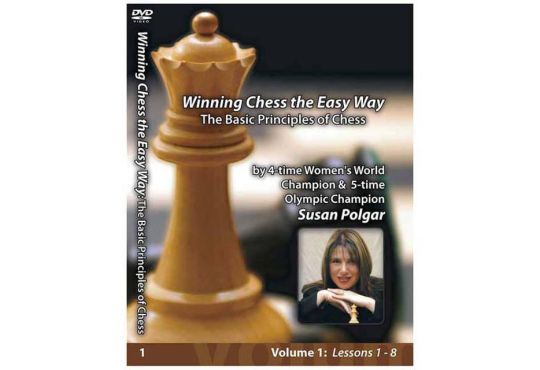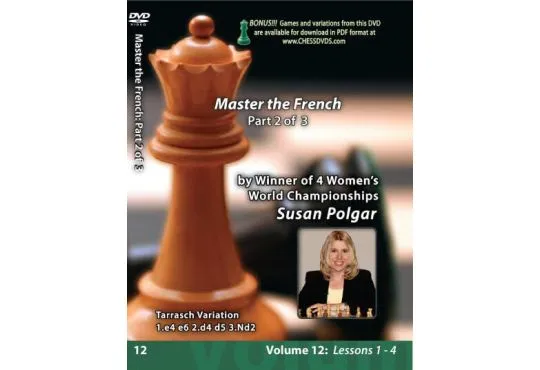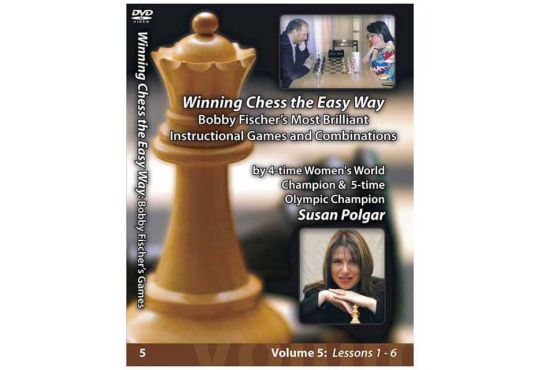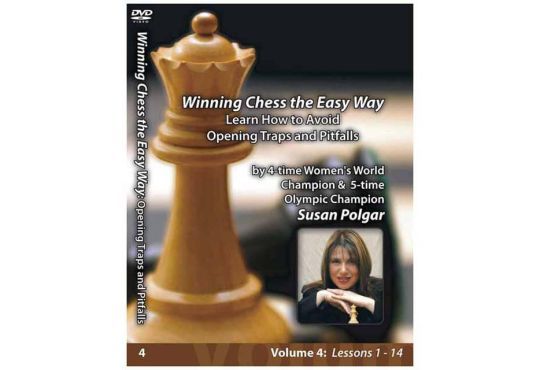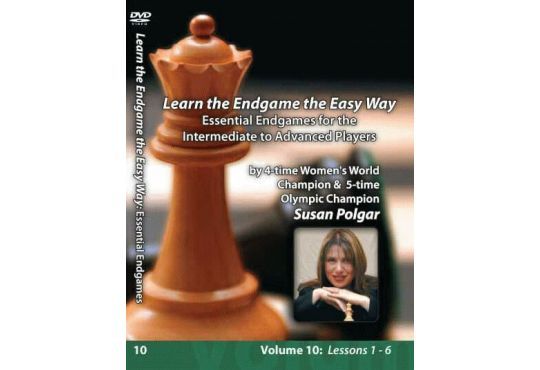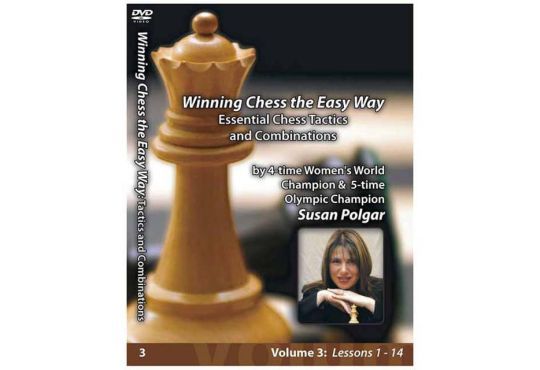USCF Sales Talks with GM Susan Polgar about Her Book, “Rebel Queen”
Are world champions born or made? GM Susan Polgar was born in Hungary in 1969, behind the autocratic Iron Curtain. By 1974, under the innovative learning environment her parents created, she was winning chess tournaments. Her new book, “Rebel Queen,” tells the story of her unusual and inspiring fight to compete for the title of Grandmaster on the same terms as the leading men of chess.
I had the pleasure of sitting down with Susan to talk about “Rebel Queen” and her career. From Susan’s childhood to her current passion for teaching and promoting chess, her autobiography sheds light on the personal, professional, and institutional challenges she faced on the road to her many titles, including Women’s World Champion, Olympic Champion, and Grandmaster.

A Conversation with GM Susan Polgar
This interview has been lightly edited for length and clarity.
Ratcliffe: Your parents seemed to be very progressive in their ideas, such as homeschooling and gender equality, especially for the time period and country you lived in. How did that help you claim your “place at the table” despite others’ expectations?
Polgar: I am very thankful to my parents for being brave enough to follow through with their beliefs, in spite of the expectations from the authority at that time. During the Cold War times it was very risky and dangerous not to follow government policies. They raised me with the mentality that hard work will pay off, and it is only a matter of time when, regardless of what the naysayers say. Clearly, without their lead and support I could not have accomplished what I did.
Ratcliffe: If it hadn't been chess, if you hadn't found that board game in the closet, was there something else you think your parents would have encouraged?
Polgar: As I wrote in the book, my dad introduced me to mathematics first. I think he was thinking more about the sciences, something like that. After I discovered the game and fell in love with it, there was a crossroads around the time I was six. My dad asked me whether I'd like to continue with math, which I was quite good at for my age. I was very advanced or chess, and that was an easy choice for me. I enjoyed chess a whole lot more than I did mathematics ever, even though I was good at it at the time. Yeah, so that could have been other things, obviously on that horizon. But I'm glad it turned out the way it did.
Ratcliffe: As a very young prodigy, you were tolerated, even celebrated, as a novelty. When you wanted to be treated as a peer later, that changed. Do you feel like tween and teen girls still face challenging attitudes, or has that improved?
Polgar: While things have improved, unfortunately girls in chess today still face sexist attitudes from some men. In addition, there are still people who do not believe that girls belong in chess, or good enough for chess.
Ratcliffe: Prodigies often have mediocre later careers as others catch up in ability, or they can burn out entirely. What was key to your continued development and love affair with chess?
Polgar: I was fortunate to have my first success early on. Still as a 4-year-old, I won the elementary girls’ championship of Budapest (11 and under), with a perfect 10-0 score. Success fuels motivation, motivation makes training feel natural, which brings more success. The daily sense of improvement (no matter how small) gave me a sense of constant progress in the right direction, both as a player and eventually as a coach.
Ratcliffe: From a young age, your goal was to be the first woman to achieve a GM title through norms and rating. Was there ever a time when you doubted you would make it, or was it just a matter of time?
Polgar: I had no doubt that I could get there. I believed that it was only a matter of time.
Ratcliffe: The Hungarian government sought to control your career to make it fit their desired narrative. Were you resigned to the possibility that their hostility might derail your career permanently, or did you have a Plan B?
Polgar: I had no plan B. As one would say, I literally put “all my eggs in one basket.” I believed that I did the right thing (both when it came to training hard as well as trying to play against the toughest competitions I could, which were men at the time). Therefore, my attitude was, “They may delay my progress, but they CANNOT stop me.” Eventually, my moves on the chess board and tournament results proved that I was right.
Ratcliffe: I found the repeated international travel requests and denials to be very like a game of chess between your family and Hungarian officials. When they finally “blundered” and had to approve a trip, your mother’s persistence paid off. Did you have a sense that you were beating the authoritarians at their own game?
Polgar: I guess at some point they understood that it looked ridiculous to the entire world that they were preventing their own star from traveling, who was already the #1 ranked woman player in the world, and they better give in. Unfortunately, I lost a few of my most important developmental years. But it was something worth fighting for, both on a personal level and for all other female players.
Ratcliffe: In 1987, Hungary’s refusal to allow you to play in the Zonal because you are a woman threw you into a depression, which you eventually recovered from (thankfully). Have you had other setbacks that affected you this deeply?
Polgar: Fortunately, those setbacks were short-lived. The other big disappointment I had to endure was when FIDE gave 100 free rating points to almost all female chess players around the world, except me. Their ridiculous reasoning was that somehow it was easier for me to gain rating points by playing mostly against male opponents. It is still perhaps the craziest and most outrageous move by FIDE to date.

Ratcliffe: When you mentioned the song “Rasputin” by Boney M as the Polgar sisters’ “hype song” for the 1988 Women’s Olympiad, I laughed—that’s on my 13-year-old daughter’s playlist! Were there any other rituals or superstitions you picked up along the way for tournament luck?
Polgar: There were different phases. There were times when I kept on using the “winning pen” or the same pre-game walking ritual, until they lasted. It is good to have routines that can help with relaxation while boosting self-confidence.
Ratcliffe: You mentioned several times in the book that you enjoy physical fitness. You also mentioned a connection between physical fitness and your mental fitness for a game like chess. Can you expand on that a little bit? I think many people think of chess as sedentary.
Polgar: I very much believe in a holistic approach as a player, and as a coach as well. As they say, “Fit body, fit mind,” and vice versa. It's really important to be in good physical shape for chess, actually, because chess competitions can be extremely demanding. They can be grueling mentally, emotionally, physically, in every way. At SuperNationals, the kids have super long days. It’s not uncommon to have 6, 8, 10-hour days competing, and that's not counting the prep time in between. Unlike it first appears, it's extremely exhausting physically. I think being in good physical shape is extremely important, especially when it comes to endurance enhancing exercises.
Ratcliffe: Did you feel somewhat insulated from the end of the cold war as someone with a higher profile and more options, or was it a time of fear and anxiety for you?
Polgar: It was very fortunate that we won the Chess Olympiad in 1988 against an unbeatable team from the Soviet Union (they won Gold in every single Olympiad they participated in). That changed my family’s life 180 degrees, for the better. We went from being the black sheep of the country to the “Golden Girls” literally overnight. So, by 1989 when the Berlin Wall fell, we were already national celebrities, and the system change was more smooth.
Ratcliffe: It seems like you were a bit sheltered despite your success and world travel as you came into your young adulthood. Do you think you had a steep learning curve once you struck out on your own?
Polgar: For sure, at times I felt overwhelmed initially. But I was a fast learner and caught up relatively quickly with the everyday demands of adult life. I like being independent. For example, I was the first in my family to get a driver’s license and buy a car.
Ratcliffe: You have too many titles and honors to mention them all, but what are you most personally proud of related to chess? Not related to chess?
Polgar: I am most proud to breaking the gender barrier, of becoming the first woman in history to earn the “men’s” grandmaster title by norms and rating. Not related to chess, probably my curiosity and desire to learn and branch out. For example, I became educated in finance and investment. I even co-wrote the best-seller Rich as a King: How the Wisdom of Chess Can Make You a Grandmaster of Investing.
Ratcliffe: You really embraced teaching and coaching, from sitting with your sisters all the way to winning at Webster University. What’s one piece of advice you have for parents and coaches about teaching chess?
Polgar: Be patient! Everyone learns at their own pace. It is very important for children to develop love and passion for the game. Focus on the process of learning more than on the result itself.
Ratcliffe: You talk about your Jewish heritage in a lovely way, as an indelible and treasured part of yourself. How do you think it has helped you as you weathered the ups and downs of your life and career?
Polgar: All four of my grandparents were Holocaust survivors (they were the lucky ones, as we lost over 300 members of our extended family). When I had difficult times during my chess career, I remembered that it was nothing compared to what they had to endure, and it always helped me to put my situation in the right perspective.
Ratcliffe: There is a strong thread of generosity through your story, whether it involves your parents inviting people to stay in their small apartment, you teaching your sisters, or the impact you hoped to make on students. Were your parents your role models?
Polgar: Yes, they are my role models, and very good ones. They sacrificed so much for me, and much later on, my sisters. Instead of having the typical lifestyle of a young couple, going to restaurants, vacations, saving for a car, they spent all their time, energy, and limited resources to advance my chess career any way they could. I could not ask for better or more supportive parents.
Ratcliffe: I get strong eldest sister vibes from your story. You were the first to do many things in your family, but always felt a responsibility to take care of the people in your life. Are you still the eldest sister in spirit, or has that role changed as the years passed?
Polgar: When we were younger obviously it was a more dominant vibe. Now that we live in three different continents and all have adult children, it is less so. But we are still close and talk to each other often. I am always around to give them advice whenever they need.
Ratcliffe: It doesn’t seem like you do anything halfway, whether it’s Esperanto, table tennis, or chess. Is there something in your life that’s a casual hobby?
Polgar: Yes, I like music, movies, working out, or horseback riding for example, just for fun.
Ratcliffe: You stated that “proving my critics wrong is my greatest source of motivation.” How has that helped your career, and how did it hinder it?
Polgar: One of my favorites stories about that was:
“That June I was in Bilbao, Spain, facing some of my stiffest competition to date, including the former world champion Anatoly Karpov. There were doubts among some people that I even belonged at a tournament that strong, doubts that at least one player, the Serbian Ljubomir Ljubojevic—number six in the world at the time—didn’t mind airing publicly. Before the competition even got underway, he asked rhetorically in the press why a woman would bother playing in such a tournament. It was a personal affront to me as well as Maia Chiburdanidze, the only other female player in Bilbao. But I took it as a challenge. If he wants to know whether I belong here, I thought to myself, I guess I’ll just have to show him. And I did, beating him pretty handily with the white pieces in the tournament’s second round. It was my most important victory up until that point. Ljubojevic had underestimated me, and I made him pay for it in front of some of the best chess players in the world. It was such an upset that the national news took notice. Writing in El País, one of Spain’s largest newspapers, the journalist Leontxo García wrote: “Polgar’s victory was highly applauded by the spectators and was a great surprise for the specialists, who barely remember similar events.” (quote from Rebel Queen)

Ratcliffe: You had many different successes and some failures. Do you have any regrets about your professional career? Is there something that you wish you had done or done differently?
Polgar: Just like in chess games there will always be thoughts such as “I could have played better”. With today’s experience and wisdom, I would do some things differently in my personal life. As you read in the book, I could have made better decisions. Obviously, there is always room for improvement. But generally, I try not to look back.
I have always told my students, don’t waste time looking back too much. Yes, learn from the mistakes, but you can't change the past. Look for ways to make better decisions on and off the chess board in the future.
Ratcliffe: You have redefined your “purpose” in life several times already—what’s the next chapter for Susan Polgar?
Polgar: Currently I am busy with various activities related to the release of Rebel Queen, including the possibility of making it into a feature movie. Also, I am spending a lot of time on behalf of the Susan Polgar Foundation promoting chess, especially for girls. This is something very dear to my heart.
Ratcliffe: Thank you so much for taking the time to speak with me.
Polgar: You as well! Take care.

A Chance to Meet GM Susan Polgar at SuperNationals VIII Is Coming Up May 9 and 10
Susan Polgar’s latest book, “Rebel Queen,” is currently available in hardcover, e-book, and audiobook from your favorite bookseller. Susan is the author of countless books on chess training and theory, including the popular “Learn Chess the Right Way” series.
If you’re lucky enough to be attending SuperNationals VIII in Orlando, Florida this year, Susan Polgar will be there in person on Friday, May 9, 2025, and Saturday, May 10, 2025, from 4:00PM to 5:00PM (Hall WA3) signing copies of her book! Don’t miss this chance to meet Susan and grab a your very own copy of “Rebel Queen.”
Praise for “Rebel Queen”:
“Rebel Queen reveals the making of a chess champion, Susan Polgar, from her early childhood to her outstanding adulthood. It tells the story of her resolute personality, fighting for the right for herself and other women to play in tournaments in which women were denied entry for years, and later training talented young men and women to become excellent chess players. A brilliant life. A brilliant book.” ―Dr. Frank Brady, Member, U.S. Chess Hall of Fame and New York Times bestselling author of Endgame: Bobby Fischer's Remarkable Rise and Fall - from America's Brightest Prodigy to the Edge of Madness
"Rebel Queen reveals the inner workings of an exceptional mind with honesty and sensitivity. I've known Susan Polgar for over 40 years. She is one of the greatest and most impactful figures -- champion, mentor, writer, doer -- in the entire history of chess. And, as this fantastic memoir makes clear, she's also a masterful storyteller. Hers is quite literally a game-changing life.” –Lev Alburt, Grandmaster and three-time US Chess Champion


